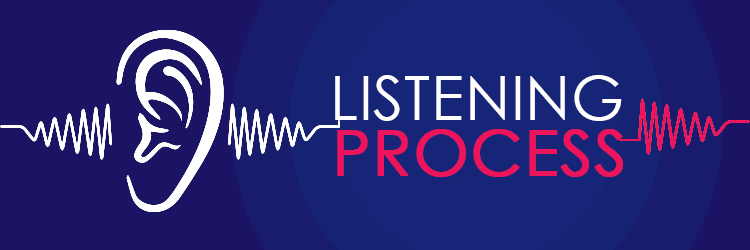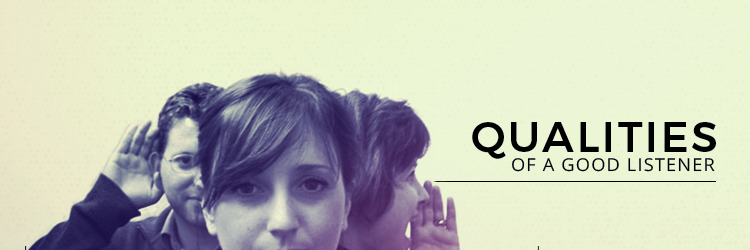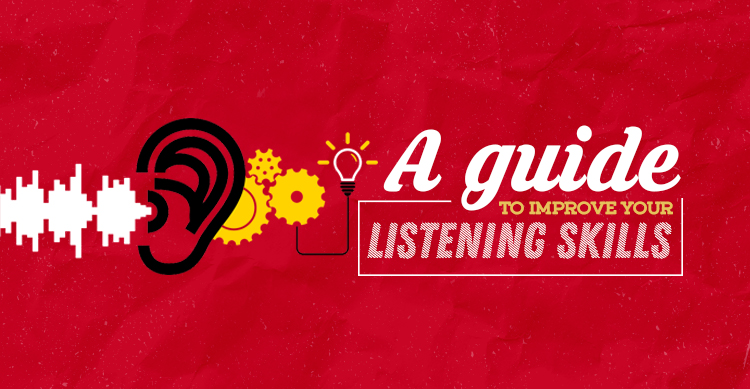Are we all aware of listening skills? Probably most of us do not have a clear idea about listening skills. You might have missed some business opportunities or job opportunities owing to poor listening skills.
Make sure you do not miss your next opportunity because of your unawareness on listening skills. Here is a detailed guide to hone your listening skills
Listening Skills
Listening can be defined as the ability to receive and interpret messages accurately, in the communication process. It is the key to effective communication. When one is not able to listen effectively, messages can be misunderstood.
Due to this, the message breaks down leaving the sender of the message in a frustrating state. If you wish to improve your communication skills then listening is a must. They are important in every walk of life.
Listening skills are highly important, so much so that employers provide listening skills training to their employees. It is well known that effective communication can lead to greater productivity with fewer mistakes and increased sharing of information, which leads to more creative and innovative work. So many successful entrepreneurs and leaders credit their success to their good listening skills.
Listening skills can also prove to be very beneficial in everyone’s personal lives. It helps one in maintaining a greater number of friends, colleagues and social networks. It gives an increased confidence and self-esteem. It also helps students to get higher grades in school or college or in academic work.
It leads to better health and overall a greater sense of well-being. According to some studies, it has been shown that speaking raises blood pressure whereas listening can bring it down.
Listening vs. Hearing

Many people mistake listening as the same as hearing. However, both of the processes cannot be termed as same. Hearing is when sound enters your ears. It is a physical process, which happens automatically, provided that you don’t have any hearing problems.
On the other hand, when listening is being talked about, it requires more than hearing. Listening requires focus and a concentrated effort, mental and sometimes physical too.
Listening is not only about paying attention to the story. It is about the way story is being told, how the voice and language are being used along with the body language of the person telling the story. It is about knowing and understanding both, verbal and non-verbal messages.
The ability of each person to listen differs according to the degree to, which you are able to perceive and understand those messages. Listening cannot be called as a passive process. It is a process in which a listener should be involved as much as the speaker.
One would often hear about the term ‘active listening.’ This term can be defined as the process of being fully involved.
The famous author, Rachel Naomi Remen has described learning in one of her quotes, which says, “The most basic and powerful way to connect to another person is to listen. Just listen. Perhaps the most important thing we ever give each other is our attention.”
Time spent on listening
On an average, a lot of time is spent on learning. Adults spend 70% of their overall time in being engaged in some kind of communication or the other. A research has shown that, of this, 45% of the time is being spent on listening, 30% speaking, 16% reading, and 9% writing.
Therefore, there is a lot of time for listening. It is worth taking a little extra time to ensure that you listen properly and effectively.

This has been proven by the research of Adler, Rosenfeld, and Proctor in 2001.
Interplay: the process of interpersonal communicating (8th edition), Fort Worth, TX: Harcourt.
Hurdles to effective learning

There are some hurdles or barriers, which lead to ineffective learning. For example, it is a very common problem that a sentence distracts us or two instead of listening effectively to what the person is saying. That time is spent in thinking of the reply that one is going to give.
This clearly means that one did not pay attention to the rest of the message of the speaker. There can be a lot of other distractions as well, such as one might find the message of someone else speaking to more interesting. The speaker’s appearance can also distract you.
When you indulge in any of these, it shows in your body language too. The lack of attention is itself projected in your body language. It is harder to control body language. You may be showing lack of interest by not making an eye contact or the lack of posture.
The speaker will realize this sooner or later. He will probably stop talking due to these reasons. At the worst, they can be upset and offended.
The Listening Process

Listening is a very active process. It involves the following three basic steps.
1. Hearing
It is just a process by, which you absorb the words and voice of the speaker. You should be able to catch what the speaker is saying. For example, you were listening to a documentary or a report on zebras. The speaker said that no two zebras are alike.
If you are able to repeat the fact then you were listening to him carefully. In case you are unable to, you were not listening carefully.
2. Understanding
The next part of the process is that you are able to make sense of what is being said. It is when you have heard what the speaker has said and you are able to understand it in your own way. For example, when the speaker said that no two zebras are alike, you tried to get a meaning out of it. You try to understand that it could possibly mean that the stripes on each zebra are different.
3. Judging
Analyzing and judging what has been said is the last part of the process. After understanding what has been said, you tend to realize whether it can be true or not, whether it makes a sense or not. For example, when you thought after listening to the speaker that each zebra might have a different pattern of stripes, you tend to analyze if that can be true.
You might relate it to the fact that each human has different fingerprints so it might seem believable that zebras might have different kinds of stripes too.
Importance Of Listening Skills In Business Communications

Verbal communication constitutes an important part of business communications. One needs to constantly interact and listen to so many clients as well as colleagues in the office. The ability to not only listen but also listen effectively is what works in business communications. One needs to build up this skill to be able to work in a team environment or even individually.
Listening is such an important component in establishing commendable working relations between employee groups along with the management and the staff. Also, a small business cannot afford to alienate its customers and clients. It is very important to maintain an eye contact and give your full attention to your clients.
Good listening skills obviously have an effect on your customer relations. They define majorly whether a customer will stay with you or not. Therefore, to help you know more on the same, here is a list of a few ways in, which listening skills are important in business communications.
1. Active listening works
Active listening is when the entire attention of the listener is focused on the speaker; he tries to avoid interrupting the speaker, shows genuine interest in what he is speaking by remaining non-judgmental.
Instead of the just hearing the word, when you can imply and make sense of what the speaker is saying is when you are paying attention. This includes being able to read non-verbal clues such as the body language and facial expressions.
It may happen sometimes that facial expressions might contradict what the person is saying. It is significant to engage fully in a conversation or discussion and this is what makes it a key part of active learning. You can uncover the root of most problems by just being an attentive listener and being polite in your reply. Your inviting posture can make a big difference.
2. To Gain Information
Listening is very helpful in acquiring facts, which can help you to take better decisions for your business. For example, when you take an interview of a job applicant, you will discover his attitude for the job when you listen to him carefully and perceive what he is saying with the help of your listening skills.
You will be able to judge how he must have performed in his last job and his achievements on his resume. When you listen to him/her and analyze what he has been saying and the way his personality is, you decide whether he/she is fit for your company or not.
3. Conflict Resolution
Workplace disputes always disturb the atmosphere. Unhappy customers can also disrupt productivity and all of this can lead to an inefficient work environment. However, if one has an ability to listen he/she can convert the situation of a disruptive conflict into an opportunity in, which there can be growth.
If the upset colleagues or dissatisfied customers feel that they are being heard, it can automatically calm them down.
It can relieve their unwanted negative feelings along with providing an opportunity for the problem-solving process to begin. When you listen effectively, the clients and the co-workers get an impression that you are concerned. This forms a basis of trust and commitment.
4. Motivation and Productivity
When one learns to listen effectively, it can bring benefits to the business and the speaker. When a department listens to what the employees have to say, it does not only hear what they have to say but they also get an insight into what makes each worker tick.
If the manager is a good listener and communicator, he can motivate his employees to a greater level. Effective listening makes it easier for the manager to choose appropriate rewards for his/her employees. These can be private or public praise, responsibilities in addition or a greater amount of independence.
5. Perception Management
Working for the reputation of a small business is hard as you need to make efforts constantly. Its reputation increases or diminishes its chances of success in future along with profit.
Effective listening skills can always prevent misunderstandings along with ensuring that the first encounter creates a positive impression. All of this helps in maintaining a good reputation of the small businesses.
It must not be forgotten that when consumers are being talked about, word of mouth is a very powerful advertising medium. When one takes the time to listen effectively and tries to offer a solution to the pertaining problems at once, it gives out an impression that you have the potential to spread.
Listening is also important when you deal with suppliers or vendors. It is very helpful in creating efficient work relationships, helps in saving valuable time of both the sides and can have potentially many more benefits. Strong relationships can always benefit the business in the long run.
Examples Of Effective Learning
- When a job candidate shares that her understanding of a question, which was unclear, during an interview and asks if she is right.
- An interviewer notices that the candidate doesn’t look him in the eye while answering.
- A customer service employee repeats the complaint back to the complainant to assure that he/she has been heard.
- The manager summarizes all that her team said during the meeting and asks if it has been heard correctly.
- A counselor reassures the client by telling him that he is listening and encourages him to discuss his traumatic experiences.
- The meeting facilitator encourages his team members for their opinions about a proposal, which is being shared in the meeting.
- The interviewer asks follow-up questions to gain clarifications on what the candidate has said.
- An employee pays much attention to the speaker when the training session is being conducted and asks clarifying questions on the same.
What Makes A Bad Listener

Your listening skills can be considered underdeveloped if you keep interrupting the speaker during a conversation. If you respond poorly, failing to answer the required question will be a poor reflection of your communication skills. This gets more highlighted if you are taking a job interview.
When you talk way too much, it can be problematic. It must not be forgotten that conversations should be managed from both the sides equally. When you monopolize speaking, you fail to listen effectively leading to poor communication.
This way you prevent the other party to fully express what they wanted to. Therefore, you end up making a bad impression.
Qualities Of A Good Listener

Being a good listener requires some basic qualities and has so many advantages. It makes communication so much easier. Listening demands to interpret verbal messages along with the non-verbal clues.
If a person is in business then the importance of such skills has already been discussed. Poor listening can drag our work project and makes it more time-consuming.
Good listeners usually have quick and easy solutions. It is known that great listeners are great winners in personal and professional life. They are great motivators and communicators.
They are also great leaders in all the industries. Therefore, here is a list of a few qualities, which are needed for you to be an effective listener.
1. Make eye contact
It is really important to look the person in the eye when you are communicating with him/her. It shows that you are genuinely interested in the conversation. It reflects that you are interested in listening to the problems of the other individual and would be ready to provide your help if needed.
2. Ask questions one at a time
What happens is that sometimes we ask too many questions and expect the other person to answer them all at once. Such conversations do no reap the best results since appropriate time was not given to the speaker to explain and complete what he wanted to say, instead you wanted the answer to all your questions.
Ask one question at a time and let him complete the explanation of the question. After he finishes, you can ask him if there is anything more to be added.
3. Pay attention
Paying attention is the key component of being a good listener. One should be attentive and present in the place where the speaker is saying something.
Sometimes what happens is that your mind catches a certain word and then it travels elsewhere, leaving you distracted. You must try to avoid this by focusing purely on what the speaker has to say.
4. Do not interrupt in between
It is basic manners to not interrupt someone when he/she is talking. You must not talk in between a conversation and let the speaker finish completely. You must ask your next question only after he/she finishes.
You can give your feedback after that. When you maintain this courtesy, the other person will be fairly interested in the conversation.
5. Take Notes
This can be a helpful quality for the ones in the business. When you are in an important meeting you must take notes of the things discussed in short bullet points.
This will make things clear and help you remember them. It can also be helpful in clearing your doubts and summarize all that has been said and discussed.
6. Use whiteboards to understand better
It is not possible that you understand 100% of what the other person says. It is very reasonable that you might not get some things. In that case, using a whiteboard is advisable.
Some conversations can be explained in a better way when you tend to draw them or represent them in the form of short notes or tables. This can help to analyze your verbal communication.
7. Give a pause of a few seconds
When a person is about to finish talking, you should let them take at least 3 to 4 seconds break. This will help you judge if they have finished speaking. There are chances that the person might start talking again after their pause. Therefore, in that case, they should not be disturbed.
8. Focus on the subject
You must focus on the subject, which is being discussed and you should not direct the conversation towards any other topic. Do not jump to next question until the person is finished with the previous one. You should not divert the conversation to unrelated topics.
9. Do not show the gesture signs
This needs to be taken care of that you do not show expressions or gestures that you are ready to talk, before the other person is done with speaking. Therefore, you must not move your head forward or open your mouth to talk, etc.
Do not assume anything: You must not assume anything. If something is not understood then you can wait for them to finish and then put forward your query. You can explain what you have understood from the conversation and what not. Then you can ask the person to correct you where you go wrong.
10. Do not make early judgments
This is a very important quality for being a good listener. Before you let the speaker complete, you just pick some words and they revolve around in your mind and everything else the speaker says is not listened to. Therefore, you must not try to make early judgments and listen to the speaker fully.
11. Do not equate listening with agreeing
This is an amazing quality, which the good listeners possess. They do not equate listening with agreeing. They understand that good listening is a quality, which equips you to be able to disagree as well. When you listen carefully you understand clearly, what is it that you disagree with.
12. Willing to speak
Good listeners do not equate listening with silence. They understand the importance of communicating and that one needs to speak too after listening, to take the conversation further.
Ways To Improve Listening Skills

The importance of listening skills has already been discussed. In this high speed and busy world, communication skills have become so important. We devote lesser and lesser time to listen to each other. Genuine listening has become a rare gift of time.
It helps build relationships, ensure understanding, improve accuracy, and resolve conflicts. Therefore, to help you with all of this efficiently, here is a list of a few ways in which you can improve your listening skills.
1. Face the speaker and maintain eye contact
Divided attention does no good, neither to the speaker nor to the listener. Due to this, the communication fails. Making eye contact is considered a basic essential for effective communication. When you talk to a person, look him/her in the eye.
You must have the courtesy to face your partner with whom you are carrying out a conversation. Keep aside the things causing distractions, such as your mobile phone, papers, book or anything else. You must look at your partner even if they are not looking at you.
2. Be attentive but relaxed
Once you make an eye contact with the person, it is not that you have to stare at him/her incompetently. You need to be relaxed, in order to focus on what the person is saying. You are allowed to look away every now and then like any normal person would do. The only thing is that you will have to be attentive.
You need to deal with your mental distractions along with the background activity or noise. You should not focus so much on the speech mannerisms of the speaker that it becomes a distraction for you. In the end, obviously, do not be distracted by your own thoughts.
3. Keep your mind open
You need to be free from any thought to give full attention to the speaker. Therefore, you must listen to him/her without making prior judgments or criticize what the speaker is telling you.
You compromise your effectiveness as a listener as soon as you make judgmental bemusements. You can feel alarmed by what the person says but wait until you hear him/her out completely.
It is extremely necessary to hear and absorb without jumping to conclusions. You must take care of the fact that the speaker is using his/her words to express his thoughts and feelings that you do not know.
You will find out about how he feels only after listening properly. You should not be a sentence-grabber. There’s no point interrupting and trying to finish other person’s sentences.
4. Try to picture what the speaker is saying
You should allow your mind to work in a creative manner. It should create a model of the information being communicated in his mind. It can be an arrangement of abstract concepts or make a liberal picture. Your brain will do the work if it is focused in the right manner. What is required is that your senses should be completely alert.
When the conversation goes on for long stretches, you must try and remember the keywords and phrases. You can note them down if you want. Also, you should not spend your time planning what to say next when it is your turn to listen.
You cannot do two things at a time, rehearse and listen in this case. Your only priority should be to concentrate on what the speaker is trying to convey.
5. Do not interrupt and impose your solutions
Interrupting in between cannot be termed as a good habit. When you interrupt a person, it sends all kinds of bad messages. It may mean that what you are saying might be more important than what the speaker intends to say. Or that what you are saying is more interesting, relevant or accurate.
We all have a different pace when it comes to listening or speaking. If you are a quick thinker or nimble speaker, then you need to control your pace and be a more thoughtful communicator.
When you listen to someone talking about his problems, you should refrain from suggesting immediate solutions. The person might not want your advice. Sometimes all a person might need is a good listener.
6. Wait for the speaker for clarification
It is not possible for anyone to understand anything completely. It is human to have doubts or not to understand anything and it would be considered good if you look forward to talking to the speaker about the same. However, you must not interrupt. Wait for the speaker to take a pause.
7. Ask questions only to ensure understanding
You must only ask relevant questions. One question can take the conversation in a completely different direction. That direction might not have anything to do with the real topic being discussed or talked about.
However, sometimes you might get back to the original topic but most of the time, one is not able to. Therefore, you must think before asking a question as it should disturb the original flow of the issue being discussed.
8. Try to feel what the speaker is feeling
Your effectiveness as a good listener is assured when you try to feel every emotion that the speaker is going through and you convey it to them by your gestures, such as you can use your facial expressions or your words. You must try to feel their sadness when they are upset, their joy when they are happy and so on.
To be a good listener, empathy is a quality, which can be termed as the heart and soul of good listening. To be empathetic, you should try to put yourself in the place of the person narrating their experiences, and then feel their emotions or thoughts.
However, this takes a lot of concentration and energy but this facilitates communication at its best. It is very generous and helpful to do this.
9. Give regular feedback to the speaker
When you give regular feedback to the speaker, you make him feel that he is being heard and listened. Feedback not just means, getting back to him by speaking. It can also be in the form of a simple nod while he is discussing the topic.
Tying It All Together
By now, you must have understood how important it is to inculcate good listening skills. It is said that the world today is a global village and we are all connected to each other.
However, we do not pay attention to each other and listen effectively to be able to solve the problems that we encounter as an individual, company, nation or even the entire global village as a whole.
This shows that we are in dire need of effective communication skills. The tips to improve it have also been discussed. You can use some basic materials for practicing listening skills such as listening to a podcast episode, which you have a transcript for.
Listening to just the dialogues of some movie or show would also help. You can start with short clips and then move to the larger ones. Hence, you must learn with patience and strive to be a better listener.












